Leigh Steinberg
Newport resident Leigh Steinberg—the world’s biggest sports agent—is resurrected.- By Lilibet Snellings | Photos by associated press
Fame has a fairly typical trajectory: obscurity, struggle, success, acclaim. For Newport resident Leigh Steinberg, this operated in reverse. Once the world’s most successful sports agent—even inspiring the title character in the film “Jerry Maguire”—Leigh has endured many devastating blows during the past decade: divorce, alcoholism and, ultimately, bankruptcy. “Most people start off struggling and then have success. I started with success,” Leigh says. “No one could beat me, but I could sure beat myself.”
Leigh is sitting at his desk in a spartan office space with beige industrial carpet. Unlike his firm’s previous Newport Beach location—boasting panoramic Pacific views—Steinberg Sports & Entertainment’s new address in Costa Mesa is on the other side of the freeway. Over his shoulder, planes take off from John Wayne Airport through an ashy swipe of Southern California smog. Outside his door, though, the office buzzes with excitable interns, signs of life.
While in law school at Berkeley in the early 1970s, Leigh worked as a dorm counselor. One of his residents was future All-American quarterback Steve Bartkowski. When Steve was selected as the No. 1 NFL draft pick in 1975, he asked Leigh to represent him. At only 25, the rookie lawyer landed the rookie quarterback the largest contract in NFL history at that time—surpassing Joe Namath and O.J. Simpson. After the signing, they were interviewed at the Atlanta airport. “The reporter said, ‘We interrupt Johnny Carson to bring you this breaking news,’ ” Leigh recalls. “I looked at Bartkowski like Dorothy looked at Toto in Munchkinland.”
From there, Leigh’s career skyrocketed. He has represented the No. 1 NFL draft pick a record eight times as well as 60 first-round picks. In the early 1990s, he represented half the starting quarterbacks in the league. (When they played against each other, he says, “I pulled for both quarterbacks to play well.”) Throughout the years, he has secured more than $2 billion in deals for his clients—in various major league sports.
Philanthropic Plays
What set Leigh apart, however, was not just his shrewd negotiating. “Leigh was at the forefront of a different type of representation,” says Adam Muchnick, president and COO of Steinberg Sports & Entertainment, who has known Leigh since 1999. “Leigh was not only helping these guys build a brand and set them up for careers after sports, but also requiring his players to be role models, to give back to the communities where they came from.”
“I had an epiphany very early on that athletes could be agents for change,” Leigh says. “There’s this idol worship of athletes. They can permeate that authority complex. Kids won’t listen to adults, or cops, or teachers—but they will listen to athletes.
“I wanted people to know them for the quality of their character as much as their athleticism,” he continues. “My first program was in 1977. Every time Rolf Benirschke (of the San Diego Chargers) kicked a field goal, money was donated to endangered animals.” Throughout the years, Leigh’s athletes have raised almost a billion dollars for charities.
Troy Aikman, former Dallas Cowboys Hall of Fame quarterback, and longtime client of Leigh’s, says, “[He’s] an exceptional negotiator, but he also influenced my decision to give back to the communities and schools that impacted my career. That contribution has been far greater than anything accomplished on the playing field.”
Leigh stands and points at a map of the United States. “All these cities … we’ve started programs everywhere.” He points to Ohio. “Ben Roethlisberger went back to his home town to start a program for kids whose parents died as first responders,” he says. “We’ve started scholarships all over—Kerry Collins at Penn State, Steve Young at BYU.
“We had Lennox Lewis cut a PSA: ‘Real men don’t hit women.’ It was impactful having a big macho guy saying that.”
Leigh has worked on committees with Madeline Albright and Barbara Boxer, and has been granted four Presidential Commendations for his humanitarian work from Jimmy Carter, Ronald Reagan, George H. W. Bush and Bill Clinton.
“My dad used to say there is no ‘they.’ If you wait for the ‘they’ to solve your problems, it won’t happen. The ‘they’ is you and me,” he says.
Sober and Sporting Green
Leigh is dressed in a plaid Façonnable button-down shirt. His hair is a sandy salt-and-pepper, and the LA native is still boyishly handsome, if not sun-weathered, at 63. His appearance is tidy, save for a tobacco stain just below his collar. A tin of Skoal straight sits on his desk. He has been sober for 831 days.
The biggest irony of Leigh’s career is that, at times, he was the cobbler with no shoes. While urging his athletes to be positive role models, his own life was spiraling out of control. The man who was once called “One Beer Steinberg” was turning to alcohol to cope with a series of tragic events.
“It was a perfect storm,” Adam says. In 1999, Leigh, along with two partners, sold the firm to Assante Corp. for $120 million. Two years later, his partner, David Dunn, went his own way, taking several dozen clients with him, which led to a lawsuit. In 2004, Leigh lost his father. The following year, he lost his Newport Beach home because of mold. By 2007, he was arrested for DUI, and in 2008, he and his wife divorced (they have three children together). Later that year, he was arrested for public intoxication. “I regret not confronting the alcoholism earlier,” he admits.
In December 2009, after some failed attempts at sobriety, Leigh enrolled in rehab. “I was amazed by the positive response when I made a statement about my alcoholism … Charles Barkley, Red McCombs … writing to show their support,” Leigh says. “At the end of the day, my top priority was to be a good father.”
June Jones, head football coach at Southern Methodist University and longtime client of Leigh’s says, “[He] has struggled these past few years personally and financially because of some poor decisions made by himself and those he trusted. But through the ups and downs, he has always remained true to the basic core principles that he instilled in all of us.”
In sobriety, Leigh’s dedication to philanthropy endures. Through his Sporting Green Alliance, he is working to incorporate sustainable technologies into stadia around the world. “If you take all the arenas and practice fields at the pro, college and youth levels, that’s a lot of real estate,” he says. While the organization may be paid consulting fees by some groups, Leigh says: “Our main goal is to push the climate change issue in the world, whether we get paid or not.”
His other great passion: concussion awareness, for which he has been lobbying that baseline testing be mandated. “Athletes have gotten bigger, stronger and faster, but the equipment to protect them has not,” he says.
“In 1995 Troy [Aikman] was in a dark hospital room and he asked me, ‘Why am I here?’ I said, ‘You suffered a concussion.’ And he asked, ‘Did I play well?’ I told him yes and he asked what that meant. I said, ‘It means you’re going to the Super Bowl,’ and his face brightened. Then 10 minutes later he asked, ‘Why am I here?’
“That is when I started to get really concerned about concussions,” Leigh explains. “It came to a point where I felt like I couldn’t represent players if I was enabling this. I’ve always tried to treat my clients holistically, as not just athletes but human beings.”
The Rise and Fall of a Super Agent
Scattered around Leigh’s office are a handful of autographed baseballs and footballs, a signed Sports Illustrated cover of Steve Young and a signed poster of Troy Aikman. “Unfortunately, this is just what’s left,” he says. “When I was in rehab, they put a lien on my storage lockers and repossessed millions of dollars of memorabilia. I used to have pictures with Barack Obama, George Clooney, Matt Damon.”
Two photographs remain: one of him and Julia Roberts, during the filming of a Lennox Lewis fight for “Ocean’s Eleven,” and one of Leigh sandwiched between Cuba Gooding Jr. and Tom Cruise, from “Jerry Maguire.”
“Cameron Crowe called in 1993 and asked if he could shadow me to do research for a film about a sports agent,” Leigh recalls. For two years, Crowe followed him to press conferences, league meetings and NFL drafts. “Tim McDonald was a strong safety for San Francisco and Cameron asked him what he was looking for. Tim said, ‘I want them to show me respect, to show me winning, to show me economic compensation,’ ” Leigh says. “This is how Cameron tells the story anyway. McDonald claims he said, ‘Show me the money,’ but Cameron says he wrote that line.”
During filming, Leigh taught Jerry O’Connell how to throw a football (“He was a theater major at NYU,” he notes), he vetted the script (he has since done this for several films, including Oliver Stone’s “Any Given Sunday”), and he even made a couple of cameos.
When the film debuted in 1996, it immortalized Leigh’s status as “Super Agent.” Soon after, however, the man who hosted 5,000-person Super Bowl parties—replete with celebrities, pop stars and politicians—started to come apart financially. The connection between his drinking and financial problems is clear. As his consumption increased, he neglected to pay personal and business bills, and failed to respond to lawsuits seeking to collect those debts, leading to a series of court judgments against him.
“That he was able to achieve such a huge level of success was so unbelievable,” Adam says. “But what was more unbelievable was that he was able to lose it all.”
“I had an un-spendable amount of money and somehow it went away,” Leigh says. “But money has never been my only goal.” He has handled the setbacks with perspective. “It was always clear to me that I wasn’t a starving peasant in Darfur, that I wasn’t named Steinberg in Nazi Germany, that I wasn’t suffering a life-ending illness, so there really wasn’t an excuse not to strive to come back.”
This summer, the new Steinberg Sports & Entertainment made some serious strides: Leigh was cleared from bankruptcy and got re-certified to represent NFL athletes. “We are rolling with a brand new firm that will aggregate talent in all sports and use that to power a marketing arm—set up a studio for sports-themed TV production, reality shows, documentaries, video games, apps.”
Leigh recently signed a deal with St. Martin’s Press to pen a memoir. “It’s Forrest Gump-y,” he says. “My grandfather ran Hillcrest Country Club, in Los Angeles, which was the hangout for the entertainment community. There are pictures of me on Marilyn Monroe’s lap, with Bob Hope.”
Last spring Leigh taught sports and entertainment law at UC Irvine and continues his speaking engagements about causes he cares about.
“America loves the fall of the high and mighty,” he says. “But we also love the phoenix rising from the ashes.” As Leigh has probably told his players, it’s not how you get knocked down, but how you get back up. NBM


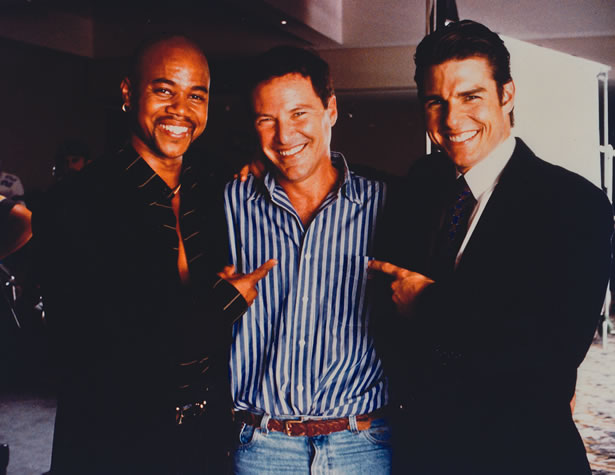
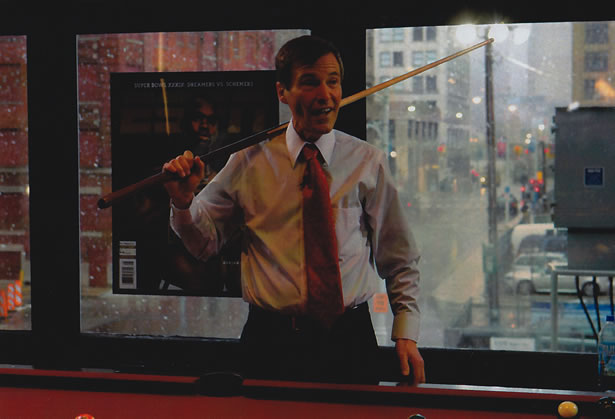
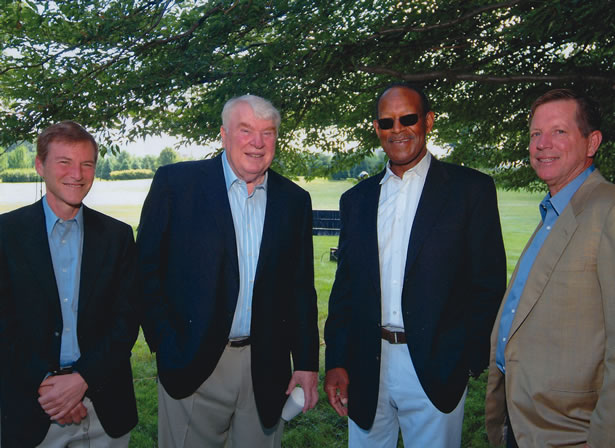
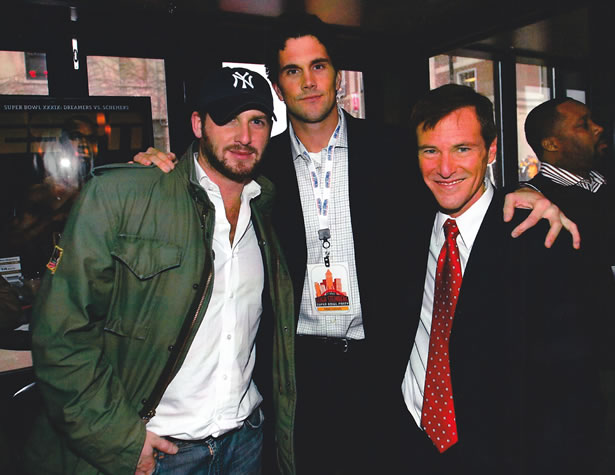
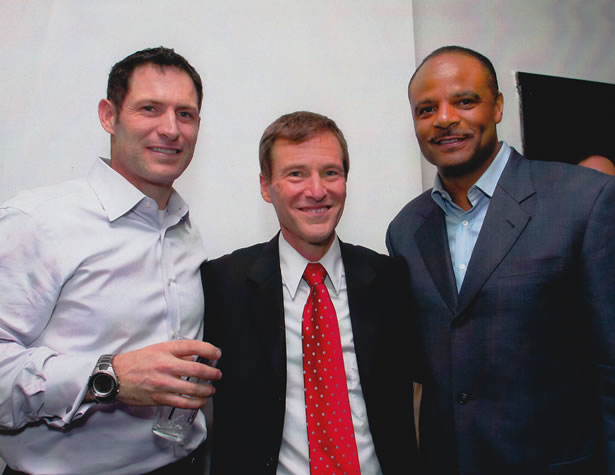
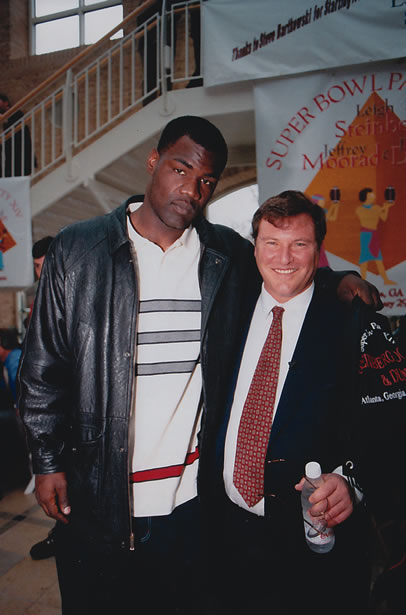



Awesomely written!